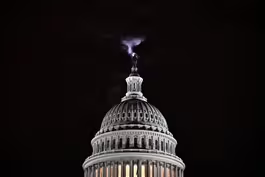
Government takes steps after collapse of banks sparks fears
Clip: 3/13/2023 | 11m 30sVideo has Closed Captions
Government takes steps to shore up confidence after collapse of two banks sparks fears
Regional banks took a beating and suffered their deepest losses in years on the stock market Monday. It came after the government's top financial authorities spent the weekend taking action to shore up confidence around the system after the failure of two major banks. Plenty of questions remain about the government's action and the potential fallout. Economics Correspondent Paul Solman reports.
Problems playing video? | Closed Captioning Feedback
Problems playing video? | Closed Captioning Feedback
Major corporate funding for the PBS News Hour is provided by BDO, BNSF, Consumer Cellular, American Cruise Lines, and Raymond James. Funding for the PBS NewsHour Weekend is provided by...

Government takes steps after collapse of banks sparks fears
Clip: 3/13/2023 | 11m 30sVideo has Closed Captions
Regional banks took a beating and suffered their deepest losses in years on the stock market Monday. It came after the government's top financial authorities spent the weekend taking action to shore up confidence around the system after the failure of two major banks. Plenty of questions remain about the government's action and the potential fallout. Economics Correspondent Paul Solman reports.
Problems playing video? | Closed Captioning Feedback
How to Watch PBS News Hour
PBS News Hour is available to stream on pbs.org and the free PBS App, available on iPhone, Apple TV, Android TV, Android smartphones, Amazon Fire TV, Amazon Fire Tablet, Roku, Samsung Smart TV, and Vizio.
Providing Support for PBS.org
Learn Moreabout PBS online sponsorshipAMNA NAWAZ: Good evening, and welcome to the "NewsHour."
Regional banks took a beating today, suffering their deepest losses on the stock market in years.
GEOFF BENNETT: It follows the failure of two major banks, and after the government's top financial authorities spent the weekend taking action to shore up confidence around the larger banking system.
No other bank failed today, but the pain is hardly over for certain banks.
Economics correspondent Paul Solman reports.
PAUL SOLMAN: Markets opened this morning, and investors promptly dumped bank stocks, despite President Biden's efforts to reassure customers and investors.
JOE BIDEN, President of the United States: Americans can have confidence that the banking system is safe.
Your deposits will be there when you need them.
PAUL SOLMAN: Damage control after the largest U.S. banking failure since the 2008 financial crisis.
On Friday, regulators shuttered the Silicon Valley Bank, SVB, and promised that insured depositors would have access to their money today.
But that left uninsured depositors with large accounts to pay their employees desperate.
Lindsey Michaelides, who runs the start-up Strongsuit, said she wouldn't be able to pay her employees or even feed her own family.
On ABC, she elaborated.
LINDSEY MICHAELIDES, CEO, Strongsuit: We have people who just bought their first house, and they're scared of, how are they going to make their mortgage payment and are they going to lose their job?
PAUL SOLMAN: So, yesterday, the government extended its promise to all depositors, insured or not.
Now, a bit of basic context.
Banks take deposits, on which they pay interest, and then lend out the money at a higher rate.
But depositors can now withdraw their money in a heartbeat, while the loans can't be recalled or sold off that quickly.
Until yesterday, depositors at Silicon Valley and every other bank in America had their deposits insured, but only up to $250,000 per person in most cases.
Problem was, almost half of all U.S. bank accounts are greater than $250,000, and thus uninsured.
In SVB, uninsured money was almost 98 percent of all deposits.
That works so long as depositors believe the bank has enough cash in the vault.
And the banks are forced by regulators to keep a cushion of reserves, in supposedly super safe U.S. Treasury bonds.
But, as interest rates have soared, those bonds have lost value, and, therefore, banks don't have the cushion they once did.
What happened last week is that depositors like billionaire investor Peter Thiel pulled their companies money out of SVB, which triggered a bank run not unlike during the financial crisis or the Great Depression, frightened depositors determined to take their money and run.
Which is why Treasury Secretary Janet Yellen and Fed Chief Jay Powell and the FDIC announced yesterday that the government will now reimburse the uninsured depositors, to reassure the likes of you and me and prevent a nationwide run.
That came as a big relief to people like Lindsey Michaelides.
And the government also threw a lifeline to customers of Signature Bank, which regulators shut down over the weekend.
But some customers remained skeptical.
ALLYN EHRLICH, Signature Bank Customer: I'm coming here to see if I have to close my accounts or not.
Hopefully, the bank will be bought by another bank, and I can keep my accounts here.
But if they're not or if there's any question, I want to empty my accounts and bring them to another bank.
PAUL SOLMAN: And as some customers lined up outside Silicon Valley Bank today, trading was halted in roughly a dozen other banks.
For the "PBS NewsHour," Paul Solman reporting.
GEOFF BENNETT: As you can see from the reaction today, plenty of questions remain about the government's action and the potential fallout from the collapse of these two banks.
Simon Johnson is closely following this.
He's a former chief economist of the International Monetary Fund and a professor at MIT's Sloan School of Management.
And Anat Admati is professor of economics at Stanford's Business School.
She has written extensively about the banking system.
Welcome to you both.
And, Simon, government agencies taking emergency measures to backstop the financial system after the collapse of two banks, that sounds eerily reminiscent of what happened some 15 years ago.
Help us understand why this time is different.
SIMON JOHNSON, MIT Sloan School of Management: Well, let's hope it's different.
Let's hope we don't get this kind of serious repercussions we experienced 2008 and in 2009.
I think, this time, what we're what we're looking at is some relatively small banks that had bad assets.
They had a lot of scared depositors.
There was a run on those banks.
And then people start to say, well, who's next?
What kind of dominoes could fall?
The government, through the Federal Reserve, the FDIC, and the Treasury Government, stepped in this weekend, and has attempted to stop the panic.
And I think, so far, they have been quite effective.
GEOFF BENNETT: Anat, the government's expansive response here to stabilize the banking system, do you think that will be enough?
ANAT ADMATI, Stanford University Graduate School of Business: We don't know for sure because there are a lot of hidden losses in the system.
And it's just fragile all the time.
So, if you put a lot of backstops on it, then you will stem at least some runs.
But a lot of these accounts, deposit accounts, are very large.
So they are very finicky.
And they could run.
Now, when they raise the insurance limit to infinity, then people will stay home.
And that's what they did during the financial crisis as well.
GEOFF BENNETT: And, Simon, if the government says that we're going to guarantee deposits above the established $250,000 threshold, doesn't that in some way reward irresponsible behavior?
I mean, what's the point of bank risk management at all if the federal government is going to come in and backstop it?
SIMON JOHNSON: No, I think what rewards irresponsible risk management is when you keep the management on and when you protect the equity holders.
That's not what happened over the weekend.
Silicon Valley Bank, and in the other bank that failed, management has been removed, and the equity holders have gone to zero.
The question of depositors is different, I think, particularly in this situation, particularly in the modern world, particularly when Silicon Valley Bank, for example, on Thursday, about a third of their U.S. deposit base tried to leave, withdraw on the same day, same business day.
That's a digital economy phenomenon, I think, the intensity of that kind of run.
And, honestly, I think it's time to ensure all of deposits.
I understand not everyone's ready to go there.
And the government hasn't done that yet.
But once you do that, as Anat said, you stop anybody's incentive to move to another bank.
There has to be then, of course, very strong supervision, and high capital requirements and very effective regulation.
And we have struggled on all of those over the past 15 years, but that's what you're going to need going forward.
GEOFF BENNETT: So, Anat, as you well know, the blame game here in Washington is well under way.
There are lawmakers pointing to what happened back in 2018 under the Trump administration, when some of the Dodd-Frank regulations were rolled back for midsized banks.
In your view, what does responsible, practical regulation look like for regional community midsized banks?
ANAT ADMATI: Well, I have ideas about what regulation should look like for all banks.
They always say, oh, the small banks are not a problem.
But then they are a problem.
All banks are a problem when they are run, with basically taking the upside and leaving the downside to others, much more than they need to be.
So, you can have a bloated system in that way where, you know, everything's fine until it's not.
So, the -- what Simon just mentioned, what I have been advocating for is a lot more what they call capital.
But I think you have to be very careful that it's not thought of as some cash reserves held on the sideline, but as equity funding coming from investors that cares about the downside.
Right now, there's too little care about the downside in the private sector.
And when the downside comes, then they go running to the government.
GEOFF BENNETT: Simon, will this change the way the Fed calculates the next rate hike, what happened over the weekend?
(LAUGHTER) SIMON JOHNSON: I think so.
Geoff.
I mean, we will have to, obviously, see how the rest of the week plays out.
A couple of problems for the Fed here.
One is that it's their raising of interest rates that has caused some of these issues for banks.
Now, why the Fed's own supervisors didn't flag that, very interesting question.
They're going to have sought that one out.
And then, of course, there's issues for the real economy.
Are there going to be problems because some people couldn't make payroll or because credit is becoming -- going to become a little more shy under these circumstances?
That is all going to have to be factored into the Fed's decision-making?
GEOFF BENNETT: And, Anat, how do regular people know if their bank is well-managed, if they happen to have their money stored away with small regional banks?
ANAT ADMATI: That's a great question, Geoff, because we don't.
And that's the whole idea.
We want to just trust that it's taken care of, and the job of people to take care of it, just like the job of ensuring our safety on the roads, is of the policeman or, in this case, their supervisors and regulators.
And they're the ones that are supposed to know that the assets are down in value, and that there are a lot of uninsured deposits to this bank who are going to be unpleasantly surprised.
So the key to all of it is effective regulation.
And we just didn't have that.
GEOFF BENNETT: What does effective regulation look like, in your view?
SIMON JOHNSON: Well, I think the cornerstone of effective regulation is to have, as Anat said, very strong levels of equity, and real equity, not fake equity -- and there's many ways that it can be fake -- the real equity that can absorb losses.
So, Silicon Valley Bank obviously didn't have enough equity.
They were running a $200 billion bank on a couple of billion dollars of equity at the end.
That doesn't work.
That's when depositors start to worry.
That's how you get panic.
So, first and foremost, get the equity right, larger buffers, more resilient buffers.
And then, of course, you have to have sensible regulation about, how much risk is a bank like that allowed to take?
Again, Silicon Valley Bank, we already know took a lot of risk, funnily enough by buying government bonds, but they bought long government bonds, which were very exposed to -- which fall in value when interest rates rise.
And they funded themselves with short-term deposits.
So they pay more on deposits, the value of their assets is less, they have no equity.
And that was the realization people came to on Wednesday of last week.
End of Thursday, the bank is gone completely, because they couldn't find enough liquidity to match their withdrawals.
One day, that's all it took.
GEOFF BENNETT: Anat, what do you see as the ripple effect here for the tech sector?
ANAT ADMATI: Well, the tech sector got saved because they wanted to make payroll, and the government didn't want panic.
So they kind of could breathe a little easier in terms of their deposits.
The tech sector funds itself in all kinds of ways.
A bank is not usually the way they fund themselves.
They go to venture capital.
They fund themselves in other ways.
So, the tech sector has its own problems right now, the crypto turmoil, all kinds of other things.
But, I mean, this banking part of it is just a wakeup call on the fragility of banking, basically.
And the bank couldn't raise equity.
That was a huge flag.
That means that they were too deep in the hole by that time.
It was for the regulators and for the supervisors to know that that was really an accident waiting to happen.
GEOFF BENNETT: Anat Admati and Simon Johnson, thank you both for your insights.
Appreciate it.
ANAT ADMATI: Thank you.
Biden approves controversial oil drilling project in Alaska
Video has Closed Captions
Clip: 3/13/2023 | 4m 44s | Controversial oil drilling project in Alaska approved by Biden administration (4m 44s)
Congress battles over priorities, but finds some agreement
Video has Closed Captions
Clip: 3/13/2023 | 5m 16s | Congress battles over conflicting priorities, but finds some bipartisan agreement (5m 16s)
Drought, overdevelopment cause record low water levels
Video has Closed Captions
Clip: 3/13/2023 | 8m 2s | Persistent drought and overdevelopment cause record low water levels for tens of millions (8m 2s)
How 'Everything Everywhere All at Once' may change Hollywood
Video has Closed Captions
Clip: 3/13/2023 | 9m 3s | How the Oscar wins for 'Everything Everywhere All at Once' could change Hollywood (9m 3s)
The risks student-athletes face amid sports betting boom
Video has Closed Captions
Clip: 3/13/2023 | 8m 46s | The risks student-athletes face amid sports betting boom (8m 46s)
Providing Support for PBS.org
Learn Moreabout PBS online sponsorship
- News and Public Affairs

FRONTLINE is investigative journalism that questions, explains and changes our world.

- News and Public Affairs

Today's top journalists discuss Washington's current political events and public affairs.












Support for PBS provided by:
Major corporate funding for the PBS News Hour is provided by BDO, BNSF, Consumer Cellular, American Cruise Lines, and Raymond James. Funding for the PBS NewsHour Weekend is provided by...




